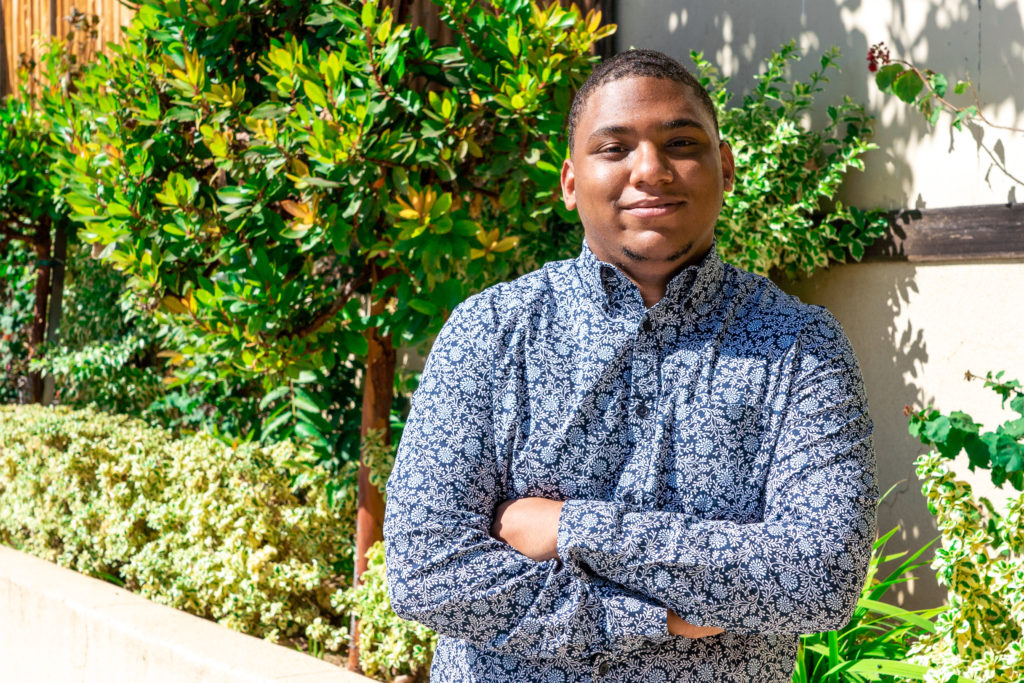As more online misinformation spreads, we’ll continue to see low rates of vaccination from high levels of vaccine hesitancy.
Despite the wide availability of COVID-19 vaccines in the United States, along with ambitious public education campaigns, just 49.1 percent of the U.S population is vaccinated, according to the most recent data at the Washington Post .
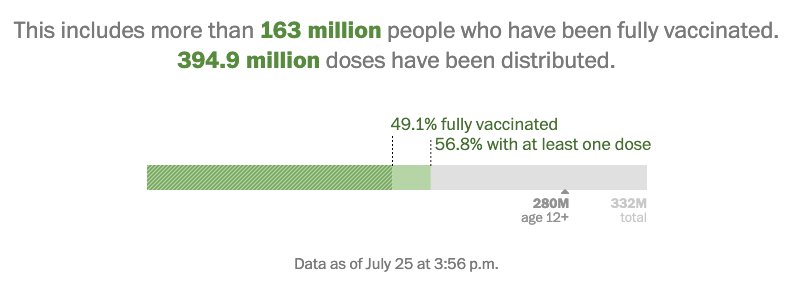
Among states, the highest vaccination rates by population are in Vermont at 67.3 percent with its population of just 650,000 residents – and a racial demographic composition that’s 94 percent White, making it one of the least diverse states in the nation.
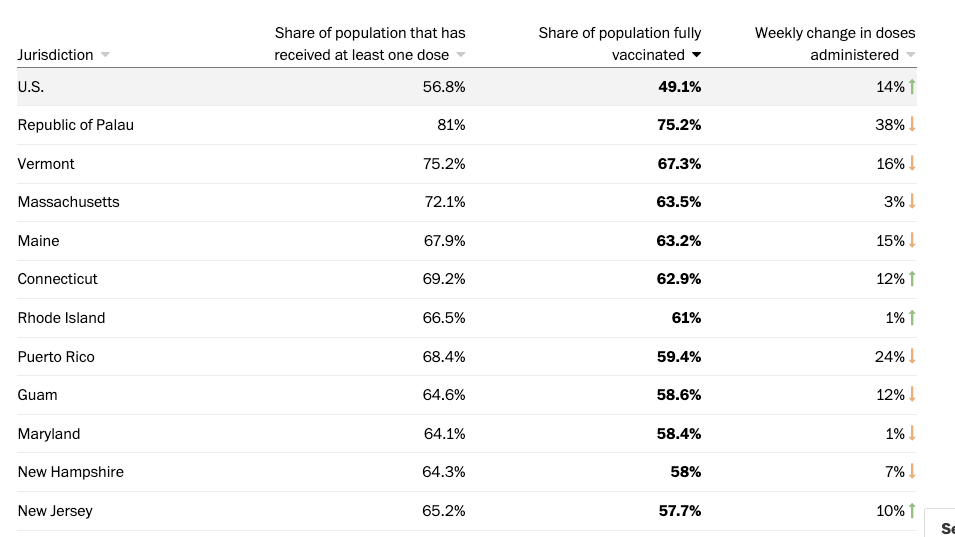
While vaccination rates are beginning to rise in certain states, they are still generally flat. It will be a long time, at this rate, before the U.S. reaches “herd immunity” or that threshold where at least 70 percent of the entire population is fully vaccinated. One major reason cited by public health officials behind the high numbers of still unvaccinated people is the enormous level of vaccine misinformation being spread across the internet. From the entirely baseless claim that there are “tracking devices” in vaccines to over-hyped concerns about very rare cases of “heart inflammation,” too many people are relying on social media posts, especially on platforms such as Facebook and Twitter, for actual scientific evidence.
In a March 2021 analysis from Pew Research entitled “Misinformation and the Coronavirus Vaccines”, researchers found that “30 percent of Americans do not intend to get a COVID-19 vaccination” with a high percentage of that group alarmingly persuaded by misinformation on the vaccine. If that same 30 percent were better informed and educated about vaccines, it’s likely the 49.1 percent of the population fully vaccinated would jump to 79.1 percent, putting America well beyond minimum herd immunity. Yet, sadly, the closer we get towards herd immunity, the greater vaccine disinformation and misinformation proliferates.
There are a variety of reasons many Americans are deciding not to get vaccinated. Some have objected due to religious beliefs. Some are worried about the vaccine ingredients and false claims of the vaccine “backfiring,” which includes “29 percent of healthcare workers” who responded to a Kaiser Family Foundation survey. There are also specific racial demographics, including African Americans, who do not trust healthcare providers due to generations of neglect, bias and racism from the medical community.
Interestingly enough, the group already able to access the most accurate and credible information on vaccines also appears as the group most susceptible to vaccine misinformation. RAND political scientist Jennifer Kavanagh calls this “Truth Decay” in a recent brief on the subject …
The level of Truth Decay is accelerating and it’s becoming widely viewed by public health experts and practitioners as the leading culprit behind vaccine reluctance. “If you are this far in the game and refusing vaccine, there is another reason you’re not getting it. Because it’s a lot of documentation out there that this works,” Dr. Chris Colbert, Assistant Director of Emergency Medicine at the University of Illinois-Chicago told WURD’s Reality Check this week. “If this was a topic as simple as sports, like say giving incorrect scoring data on Lebron James, the world would stop and say absolutely not, that’s wrong. When it comes to the topic of vaccine, we’re having a conversation that doesn’t need to be had.”
A March 2021 Axios-Ipsos poll found that’s a huge problem, with a direct link between the dissemination of falsehoods on vaccines and the likelihood of an individual finally getting vaccinated: the Americans most likely to believe in disinformation claims are those most likely to say they weren’t getting inoculated
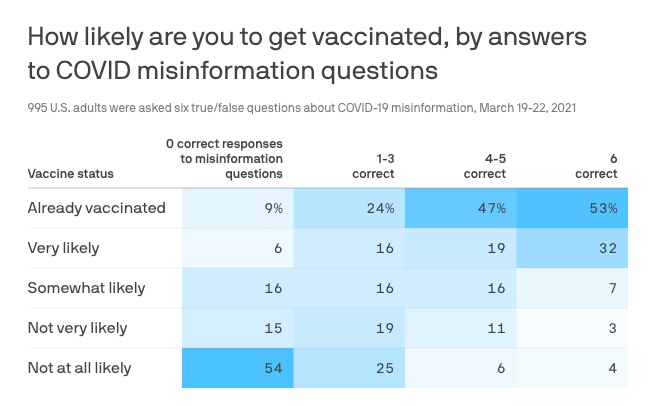
Truth Decay is not an entirely new phenomenon, but its current manifestation has worsened and spread since the early 2000s. It’s defined by several trends, including growing disagreement about basic facts (something that is happening around vaccines) and declining trust in institutions, such as the news media and the government (another problem witnessed in the COVID-19 era).
A. Nelson
Public health officials and practitioners are acknowledging the extent to which they underestimated the influence of disinformation, especially when – at the time of that Axios-Ipsos poll – access was still a major problem. However, five months later, many vaccine pipeline and logistical issues have been resolved, thereby making the vaccine more widely available than it has ever been.
Still, while disinformation is a major problem, there are multiple solutions including, but not limited to, simple education. These are also other deeper and systemic problems requiring much deeper, longer-term fixes. Political polarization doesn’t help: many Americans simply do not trust what the other has to say, with left and right each viewing the other as an enemy, and that’s hampered government’s ability to respond decisively. Another problem is massive distrust of government which leads to lack of confidence in government’s ability to respond to a crisis.
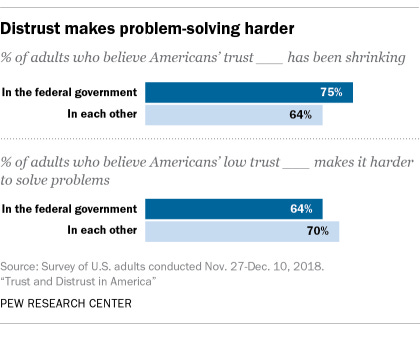
Americans are overwhelmed by constant headlines of government agencies being indecisive about mandates, politicians wrangling over the best course of action, and high profile elected officials breaking everything from lock down rules to basic public health protocols like masking – even as they’re demanding compliance from average citizens. Suspicion and skepticism in the aftermath of events such as the infamous Tuskegee Experiment and the MK-Ultra fiasco also cause large portions of Americans to continue distrusting the government. Part of this is due to misinformation and the deliberate spread of lies by interests with ulterior political motives. Yet, there are events and issues which are entirely proven and credible, and that contributes to a broader public outrage over hypocrisy and half-truths.
Due to these reasons, and others that may not be fully clear, a vast amount of Americans are just saying no to vaccines. State, local and federal governments will need to quickly rebuild trust with constituents, and the American people will need to collectively work together on science literacy, education and the elimination of harmful misinformation on the Internet. Once steps are taken towards these two solutions, only then can our nation reach herd immunity and achieve some form of what we once knew as “normal.”
In partnership with TheBENote.com
